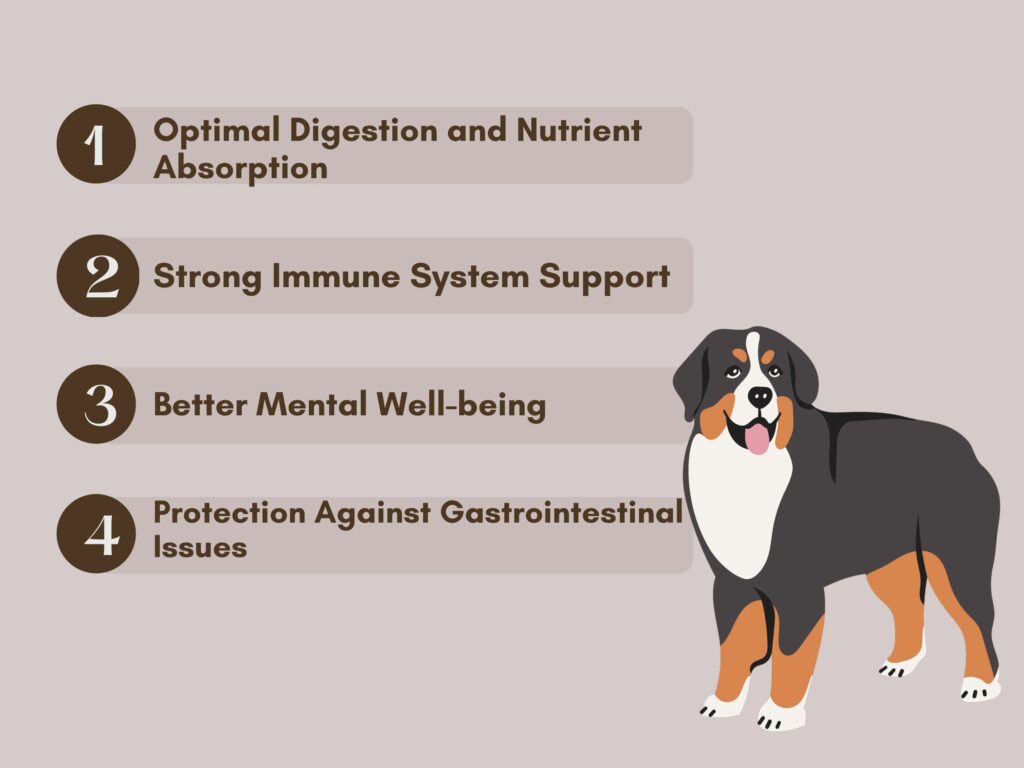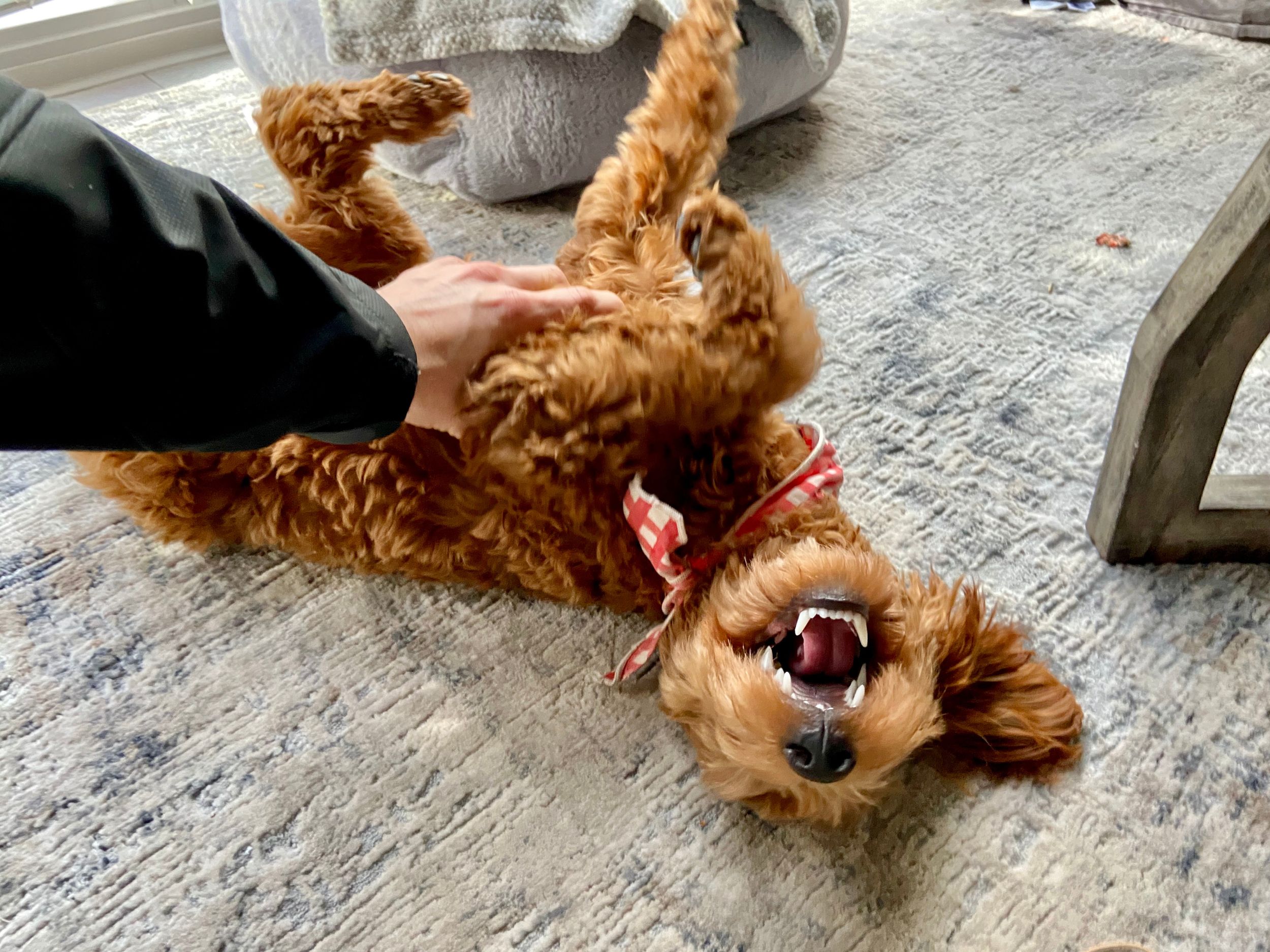Your dog’s gut health is pivotal in its overall well-being. A complex community of bacteria, fungi, viruses, and other microorganisms exists within the gut. This ecosystem, termed the microbiome, influences digestion, immunity, and even a dog’s mood. Research shows that a diverse and well-balanced microbiome can fend off numerous ailments, with a study from the NIH suggesting that a balanced gut enhances nutrient absorption, bolsters immunity, and reduces inflammation.
How to Tell if Your Dog Has an Unhealthy Gut
While GI signs such as diarrhea, vomiting, and foul-smelling stools are clear indicators of gut health issues, there are more subtle signs, too. Dogs with an imbalanced gut might display anxiety, excessive scratching or licking, and may have frequent infections due to compromised immunity. A weakened immune system resulting from microbial imbalance makes them more susceptible to illnesses. Research has also found that an imbalanced gut can also cause behavior changes, lethargy, and heightened sensitivity to certain foods.
What Makes Up Dog Gut Microbiome Diversity?
The dog’s microbiome is an intricate ecosystem. It predominantly contains bacteria but also houses fungi, viruses, and protozoa. Within the bacterial realm, the dog’s gut is inhabited by several families, including Firmicutes, Bacteroidetes, and Proteobacteria. Each of these families plays a unique role. For instance, Firmicutes extract energy from food, while Bacteroidetes help break down complex carbohydrates. The balance and diversity of these families are essential for optimal health.
You might be asking just what the heck all that means. We get it. Think of the gut microbiome as a hustling, bustling city. Every microorganism that lives there has a very unique role within the city. Cities need different types of people–doctors, teachers, artists, and more. Your dog’s gut microbiome is similar and needs a range of bacteria, fungi, and other tiny critters to make it run smoothly. This assortment of microscopic characters is what we call ‘microbiome diversity,‘ and it’s key to your dog’s gut health and to keeping your dog’s digestive system running as it should.
Why is Gut Microbiome Diversity So Critical?
Think about a human city with only artists but no teachers or doctors. Sure, it might be beautiful, but who would teach the kids or care for the sick? Similarly, a diverse gut microbiome ensures that every health aspect gets its due attention, which can only help your dog and improve your dog’s gut health. Some bacteria help digest food, others fight off invaders, and some even influence mood. The more varied the microbiome community, the better equipped your pup is to handle challenges that come to a dog’s digestive system. If it’s out of whack, your dog may suffer from canine dysbiosis.
Gut Microbiome Imbalances
What is an Imbalanced Gut Microbiome?
An imbalanced gut microbiome, also known as dysbiosis, can be the root cause of various ailments. Dysbiosis affects a dog’s overall health, from digestive issues to weakened immunity. It can be triggered by factors like antibiotics, processed foods, toxins, and even stress.
Doggy Dysbiosis: When the “Gut City” Loses Its Balance
Continue to imagine your dog’s gut microbiome as a city. In this thriving city, as we’ve said, each microorganism represents a citizen with a unique job. From waste management (digestion) to city defense (immunity), every resident plays a vital role. We know the city thrives when there’s a diverse population; each district works harmoniously, ensuring the city buzzes with life and vibrancy.
However, dysbiosis is like a sudden shift in the city’s dynamics. Imagine if all the waste management workers went on strike overnight or the defense team was overwhelmed by outside invaders. This imbalance in the microbial population can lead to chaos in your dog’s digestive system.
Several culprits can cause this city-wide disturbance. Overuse of antibiotics can be compared to a mass eviction, forcing many residents out without even assessing whether they belong there and leaving vacant spaces. A drastic change in diet might resemble a sudden influx of tourists that the city wasn’t prepared for. Other factors, like stress and exposure to toxins, can be likened to infrastructure breakdowns or natural disasters.
Without the necessary diversity, our dog’s gut microbiome struggles. Waste builds up (poor digestion), the defense systems weaken (reduced immunity), and certain neighborhoods (digestive tracts) may even become desolate and dangerous. It’s crucial for the health and happiness of our furry best friends that we keep their gut city balanced, diverse, and thriving.
Do Antibiotics Harm Your Dog’s Gut Microbiome?
Antibiotics, although essential in treating bacterial infections, can wreak havoc on this balance. By wiping out bacteria indiscriminately, they can reduce the microbiome’s diversity. This eliminates beneficial bacteria alongside the harmful, pathogenic ones. Antibiotics target bacteria but don’t really differentiate between beneficial and harmful types and so when administered, they can suppress or eliminate certain very beneficial bacterial strains. This disruption creates an imbalance, increasing potentially harmful bacteria, and leading to conditions like diarrhea or yeast overgrowths. It’s also why you’re likely to hear your vet recommend probiotics if your dog has to be on antibiotics. Humans and dogs have similar positions in that arena, so it’s not unusual for your human doctor to recommend the same when treating issues with antibiotics.
Gut Microbiome and GI Diseases
The gut microbiome’s health directly affects the gastrointestinal (GI) tract. Gut health diseases such as inflammatory bowel disease, gastritis, and pancreatitis have been linked to microbial imbalances. [O’Connor et al., 2020] reported that dogs with a varied microbiome had lower chances of developing GI diseases than those with less diversity.
Treatment Strategies and Their Impact on the Microbiome

A holistic approach really is best when treating your dog’s gut health. This involves restoring the microbial balance and understanding what it needs to thrive. The delicate balance of the dog’s gut microbiome can be easily shaken up. Factors such as antibiotics, which we’ve learned can unfortunately kill both harmful and beneficial bacteria, are primary culprits. Stress, sudden dietary changes, exposure to toxins, or ingesting certain medications can also make your dog’s gut ecosystem go into a tizzy. Just like a well-tuned orchestra can be disrupted by a single out-of-tune instrument, any of these factors can lead to an imbalanced and less harmonious gut microbiome for our canine companions.
Fecal Microbiota Transplantation (FMT)
FMT is a cutting-edge treatment where fecal matter from a healthy donor is introduced into a patient. This can quickly restore microbial balance in dogs with severe dysbiosis. Yes, it sounds a bit…weird, but it’s also an incredible option if your dog’s microbiome is suffering severely.
Diet Is the Primary Way to Manage Your Dog’s Gut Health
So, a balanced diet is crucial. Ingredients, quality, and diversity matter. It’s not just about filling your dog’s stomach but nourishing its microbiome. Remember–feeding your dog isn’t solely about satisfying hunger. It involves nourishing and nurturing the microbiome. Research shows that strains such as Bacillus coagulans and Bacillus Subtilis have tremendous benefits. To foster these colonies’ growth and improve gut health for your dog, consider a diet rich in fibers and lean proteins and limited in simple carbohydrates.
Here are some other ways you can improve your dog’s gut health just by paying attention to what goes in their body:
- Focus on Fiber and limit simple Carbohydrates for Pancreatitis: Dogs with pancreatitis need a diet low in fats and simple carbs but rich in fiber. This supports digestion and limits inflammation.
- A Fresh, natural solution: Fresh foods, free from artificial additives, can significantly enhance gut health. Opt for fresh meats, vegetables, and possibly limited grains, but always check with your vet.
- Antibiotics: While essential, antibiotics should be used wisely and sparingly. Always pair with probiotics to restore balance post-treatment.
- Try Fermented Foods and Supportive Supplements: Fermented foods like kefir can introduce many beneficial bacteria. Supplements like omega-3s can further support gut health.
- Rebalance: Regularly test your dog’s microbiome. Based on results, introduce or remove foods, add supplements, and ensure balance.
- Avoid Pesticides, Drugs, And Toxins (Especially Antibiotics): Minimize exposure to disruptors. This includes certain drugs, pesticides in foods, and environmental toxins.
Use Prebiotics and Probiotics
Prebiotics act as food for beneficial bacteria, supporting their growth. Probiotics, on the other hand, directly introduce beneficial bacteria. Not all probiotics are created equal. Different strains offer different benefits. For instance, Lactobacillus might aid in lactose digestion, while Bifidobacterium can support the immune system. When choosing probiotics, opting for high-quality supplements that specify the strains contained is imperative.
What Can Probiotics Do for Your Dog’s Gut Health?
Probiotics provide a direct influx of beneficial bacteria, improving microbial diversity. These bacteria aid digestion, enhance absorption of nutrients, and even produce vital substances like short-chain fatty acids, which have anti-inflammatory effects. However, not every probiotic is of the same caliber. The effectiveness hinges on the strains present, their viability, and the dose administered.
We chose two premium bacteria strains to include in Bernie’s Perfect Poop: Bacillus Subtilis and Bacillus coagulans. These two probiotic strains often stand out due to their exceptional benefits.
- Bacillus Subtilis:
- Resilience and Strength: One of the most fascinating traits of Bacillus Subtilis is its ability to form endospores. These tough, protective coatings shield the bacterium from harsh environments, allowing it to survive extreme conditions like high acidity in your dog’s stomach. This ensures that the bacterium reaches the intestines intact and can benefit your dog the most. Many other strains in supplements don’t make it that far.
- Digestive Aid: This strain is pivotal in breaking down food, especially complex carbohydrates. It aids in absorbing vital nutrients, ensuring your pup gets the most out of its meals.
- Natural Defender: Bacillus Subtilis helps maintain a balanced gut environment by producing substances that deter harmful bacteria. This reduces the chances of harmful and opportunistic pathogens getting a foothold in your dog’s digestive system. This array of antimicrobial compounds helps it combat unwanted bacteria in the gut. Some of these compounds include (get ready; here’s the science we love so much!):
- Surfactin: A powerful lipopeptide biosurfactant exhibiting strong antimicrobial activity against several pathogens. It disrupts the cell membranes of harmful microbes, preventing their proliferation.
- Bacilysin: This antibiotic peptide produced by Bacillus subtilis primarily targets and inhibits the growth of certain Gram-positive bacteria. (That’s a good thing, promise!)
- Fengycin and Iturin are lipopeptide compounds with potent antifungal properties. They help to keep yeast and fungal populations in check within the gut environment.
- Subtilosin A is an antimicrobial peptide with a broad activity spectrum against Gram-positive and some Gram-negative bacteria.
- Subtilin: Another antimicrobial peptide that has been shown to inhibit the growth of certain harmful bacteria.
- Polyketides: These are complex organic molecules that exhibit antibiotic properties.
- These compounds play a significant role in ensuring harmful bacteria do not overpopulate the gut, and promote a balanced and healthy gut environment. It’s like saying Bacillus subtilis has its natural armory to defend its territory and ensure the dog gut remains a happy place for beneficial bacteria.
- Bacillus Coagulans:
- Fast-acting Probiotic: Once ingested, Bacillus coagulans gets to work quickly. It germinates and multiplies in the gut, enhancing microbial diversity and promoting a healthier gut environment.
- Immune Boost: This bacterium is not just good for digestion; it’s a booster for the immune system as well. It stimulates the production of immune cells and helps maintain a healthy balance of gut bacteria, which is vital for overall immune health.
- Balancing Act: One of the primary roles of Bacillus coagulans is to regulate the gut’s pH levels. A balanced pH ensures a hospitable environment for good bacteria while making it less inviting for harmful ones.
These strains in your dog’s diet promote a diversified gut microbiome, which is crucial for optimal digestive health, nutrient absorption, and a robust immune system. Using our city example, consider them as two pillars, supporting and nurturing the bustling city that is your dog’s gut!
 Ways To Improve Your Dog’s Gut And Support Your Dog’s Microbiome
Ways To Improve Your Dog’s Gut And Support Your Dog’s Microbiome
- Bernie’s Perfect Poop – Our premium blend of ingredients combines high-quality fiber, prebiotics, probiotics, and digestive enzymes. It promotes a balanced gut, ensuring efficient digestion and a robust immune system. The whole goal we had in mind when creating Perfect Poop was to enrich our own dogs’ gut health. We knew the top ingredients were a must, starting with fiber. (Get ready; more science!)
- Fermentation Fodder: High-quality fiber is a primary food source for beneficial gut bacteria. When these fibers reach the colon, they undergo fermentation by the resident microbes. This process produces short-chain fatty acids (SCFAs) like acetate, propionate, and butyrate. SCFAs are critical for gut health; they provide energy for colon cells, help regulate pH, and promote a hospitable environment for a variety of good bacteria.
- Bulking Up: Fiber adds bulk to the stool, which helps your dog have regular poops. Consistent pooping ensures that waste products and potential toxins are efficiently removed from their system. This regular ‘clean-up’ process helps maintain a balanced and diverse microbial community.
- Moisture Magnet: High-quality fiber can retain water, ensuring the intestines remain well-lubricated. This helps prevent constipation and creates a more favorable environment for bacterial growth and diversity.
- Selective Support: Certain fibers are prebiotic and are specifically designed to promote the growth of beneficial bacteria. By selectively nourishing these helpful microbes, they can thrive and outcompete potentially harmful bacteria. When discussing elements crucial to gut health, the prebiotic fibers we include (like Xylooligosaccharides [XOS] and inulin) can’t be beaten. These naturally occurring carbohydrates aren’t just passing through our dog’s digestive systems—they’re actively nurturing it. Here’s how:
- Xylooligosaccharides (XOS):
- Selective Boost: XOS is known for its specificity. It selectively stimulates the growth of beneficial bacteria, especially Bifidobacteria. In doing so, XOS ensures a more favorable balance of good-to-bad bacteria in your dog’s gut microbiome.
- Short-Chain Fatty Acids (SCFAs) Production: Like other prebiotic fibers, the fermentation of XOS by beneficial gut bacteria produces SCFAs. As we’ve said, these play pivotal roles in nourishing colon cells, regulating pH, and maintaining gut barrier function.
- Gut Barrier Reinforcement: By promoting the growth of beneficial bacteria and the production of SCFAs, XOS strengthens the gut barrier, and reduces the risk of unwanted substances entering the bloodstream.
- Broad-Spectrum Nourishment: Inulin is a food source for a wider range of beneficial gut bacteria. This fosters a diverse microbial environment, ensures multiple strains thrive, and benefits the host. That’s a win for your dog’s gut health.
- Consistency and Regularity: Inulin aids in improving bowel regularity by increasing stool bulk. A more regular bowel movement ensures efficient waste removal, fostering a healthier gut environment.
- Enhanced Mineral Absorption: One of the lesser-known benefits of inulin is its ability to enhance the absorption of certain minerals, especially calcium and magnesium. This supports bone health and ensures a well-balanced internal environment that’s good for microbial growth.
- Modulating Blood Sugar: Inulin slows digestion, which can result in a more stable blood sugar level. A balanced internal environment, in turn, supports the growth of a balanced gut microbiota.
Together, XOS and inulin work to nurture and sustain a vibrant, diverse, and balanced gut microbiome in dogs. By providing targeted nourishment to beneficial bacteria and facilitating a myriad of gut-friendly processes, they ensure that the digestive system remains a bustling hub of microbial activity, all working harmoniously for optimal health. They keep the dog gut city running well!
- Barrier Booster: The fermentation products of fiber can enhance the gut barrier function, preventing unwanted substances or pathogens from entering the bloodstream. A healthy barrier supports a balanced and diverse microbial ecosystem by preventing potential invasions from opportunistic pathogens.
- Immune Modulation: Fiber plays a subtle but crucial role in modulating the immune response. SCFAs from fiber fermentation can influence immune cell behavior, promoting a more balanced and less inflammatory environment. This ensures that the immune system does not overreact and disturb the microbial equilibrium.
In essence, high-quality fiber is like a great, multi-faceted gut toolkit. It nourishes, protects, and fosters a diverse and balanced microbial community, ensuring that our furry friends enjoy optimal digestive health. Remember, it’s not just about “filling” the stomach; it’s about cultivating a thriving gut “garden”!
- Consider A Raw Diet With Your Vet’s Blessing – Raw can mimic a dog’s natural diet, potentially supporting a healthy microbiome. However, always consult with a veterinarian before making such a switch.
- Test, Add, Remove, and Rebalance – Periodically check your dog’s microbiome and adjust diet and supplements accordingly.
Understanding and nurturing your dog’s microbiome is integral to the dog’s gut health. By feeding them correctly, using supplements like Bernie’s Perfect Poop, and regularly monitoring their gut health and the canine gut microbiome diversity, dog parents can help make sure their furry friends lead a balanced, healthy life.


